#another recurring theme of this show is second chances
Text
moments of ephemerality/permanence/YOLO/photography/control/hypocrisy etc. etc. in Only Friends ep. 4
There was a LOT of talk about various themes over the past three weeks, and last week especially, in this corner of Tumblr.
A quick review of where we've been so far:
Post Episode 1
Post Ep. 1 thoughts on ephemerality (@waitmyturtles)
Post Episode 2
Thoughts on ephemerality, permanence, YOLO, and photography post Ep. 2 (original by @ranchthoughts, additions on photography by @chickenstrangers and @lurkingshan)
Thoughts on control (@elizabethsebestianhedgehog)
Post Episode 3
Post Ep. 3 thoughts on plum wine, hypocrisy, and the demise of ships (@waitmyturtles)
Where we are headed post Ep. 3 (original by @ranchthoughts, additions on surveillance and voyeurism by @lurkingshan, @waitmyturtles, and @slayerkitty)
Photography and audio/visual in the series as of Ep. 3 (added in a reblog by @ranchthoughts)
Moments of ephemerality/YOLO/permanence in Ep. 3 (original by @ranchthoughts, additions on Yo, voyeurism, and permanence by @lurkingshan , @waitmyturtles, @twig-tea, and @imminentinertia)
Post Ep. 3 thoughts on control, consequences, and shipping (original by @waitmyturtles, addition on the ephemerality of control by @ranchthoughts)
Let's talk about trust and control (original by @slayerkitty, with additions by @lurkingshan and @distant-screaming)
Boston as photographer and voyeur (@lurkingshan)
Visual effects in the MV and BTS footage (original by @slayerkitty, additions on costuming by @distant-screaming)
Now I will dive into my various thoughts and musings based on episode 4 of Only Friends.
but first - something from another ep (I am not sure which one):
Spotted by @khaotunq! (screenshot courtesy of them too):
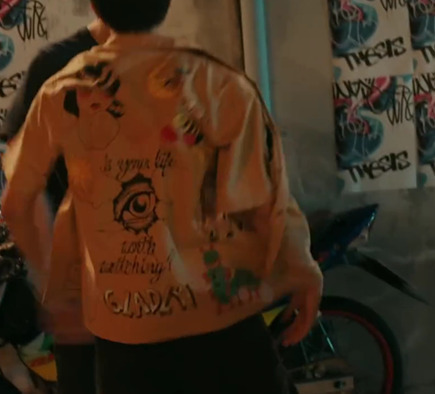
Ray's jacket says "Is your life worth something?" An especially poignant sentiment given the beginning of today's episode, where we saw how deep Ray's feelings of being a burden run.
This ties into the themes we've been exploring around ephemerality (life is short), and YOLO (you only live once, so live wildly and completely) and the associated lack of forethought and consequences. This gang of characters live fast and hard, without thinking about how their actions affect themselves or others. Due to their wealth (and youth) they haven't really had to confront the consequences of their actions yet or take accountability for them - @waitmyturtles wondered if this was a theme the show would look into. Living so recklessly, as if their life doesn't matter... believing they are a burden on others and therefore worth less... treating others as disposable/playthings in their quest for control and satisfaction... "is your [their/our] life worth something?" is a recurring question on this show.
ok now to dive into episode 4 proper:

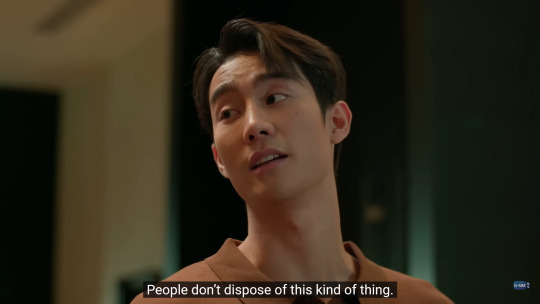
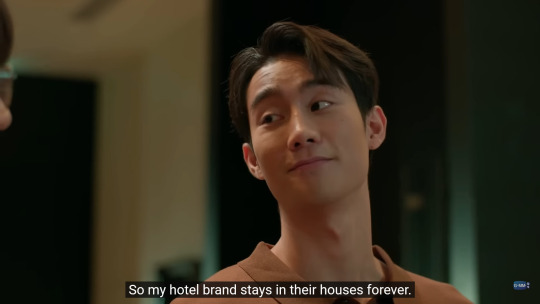
photography and permanence tied together again: Top set up a photobooth in his [family's] hotel, thus ensuring the logo will stick in their houses for a long time as people don't throw out photos. Photos are souvenirs, they are memories, they are important, we don't throw them out, they are physical objects we keep.
We've already seen a case of someone not throwing out photobooth photos, and the consequences of that with Nick finding some of Boston and Top's photobooth photos and that kickstarting his unhinged P.I. arc. Second time taking photos in a photobooth comes up in this show (and once again it's Top involved - ?).
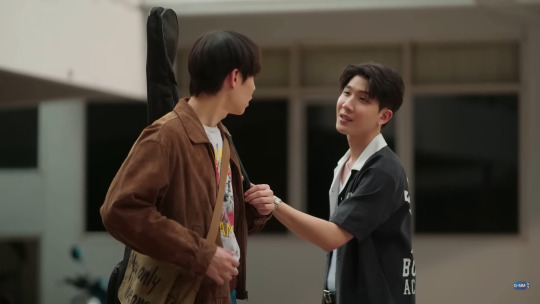
Sand once again wearing his You Only Live Once bag (I mean, we can expect to see it a lot. Sand is poor. He's only got the one bag.). In this scene he is (reluctantly) giving Ray another chance after he left him in the car the night before. Sand can see the red flags and almost inevitable end of his mixing with Ray... but those puppy dog eyes draw him in every time. Ah well. You only live once, right?
Control and Boundaries
I have been thinking more and more about control and specifically boundaries this week (in no small part due to @respectthepetty's post about Boston and boundaries). Boundaries can be permanent and steadfast and impermeable, or temporary and malleable and weak (here we go with ephemerality or lack there of yet again).
Setting boundaries this week:
Mew telling Ray they can't continue to be friends if Ray continues harbouring feelings for him
Top telling Boston to stay away from him
Nick telling Top to stay away from Boston
Mew saying he will have sex with Top if he quits drugs, Mew making it clear there will be no penetrative sex
Sand asserting to Ray he doesn't appreciate having everything paid for all the time
Mew asking for complete honesty from Top and promising complete honesty in return (sharing the details of his relationship with Ray)
Boston doesn't want intimate photos taken of himself
Crossing boundaries this week:
Ray continually texting and then eventually going to find Sand (and interrupting his rideshare) when he doesn't answer, Ray generally not taking Sand's no for an answer, Ray constantly trying to pay for things for Sand (paying the driver, offering to pay for the guitar)
Ray kissing Mew when he is asleep
Boston pushing into the elevator to corner Top
Mew conceding ground on his no sex rule with Top, Top demanding a (sexual) reward in exchange for giving up drugs
further fall out from Nick recording Boston and Top having sex in the car (he's now showing the recording to Sand)
Mew asking for complete honesty from Top, but Top not telling Mew about sleeping with Boston
Further assorted thoughts
Boston, voyeurism, photography, control, permanency/records
Boston refused to have a photo taken of himself. He can document others in vulnerable situations, and actively seeks out photos of these moments as (physical) souvenirs to keep, but no one can document him in these situations (unequal balance of power there). We have seen Boston use these permanently recorded moments to get his way (showing Top the photo of Mew and Ray kissing to sow doubt in his mind and get Top to sleep with him), and who knows how else he has used/will use the photos in his collection to serve his own ends.
Boston doesn't want intimate photos circulating because his dad is running to be a political representative and that could harm his campaign ... anyone else getting the sense that the existence/creation of intimate photos of Boston is going to become real relevant real soon? We've already seen the physicality and permanence of photographs (the photobooth photos of Top and Boston, the phone photos of Ray and Mew) come back to advance the plot and cause emotional strife...
Boston has already lost control of this situation/had this boundary crossed, though he doesn't know it yet, because Nick recorded Boston having sex with Top in the car. Based on what we've seen in the trailers and teasers around Nick and Boston, I think it is fair to expect further recording of Boston (and probably without his consent), and this time with visuals. Boston the voyeur, the documenter is having it turned around on himself.
Losing control
I mused last week about the ephemerality of control, and wondered if control would become more permanent/stable as we bring more permanent "evidence" into the mix (e.g., Boston's photos of Ray and Mew, Nick's recording of Boston and Top). This episode we got mostly an erosion of control again, though I remain interested to see where permanence of "evidence" = permanence of control or perhaps a permanence of consequences (especially given the above Chekhov's gun of a sort re: Boston not wanting intimate photos of himself - what permanent/serious consequences will this have for Boston and his father's campaign?).
Mew conceding his no sex rule with Top -> Mew has been trying to control Top through access to sex, trying to see how long he can hold his attention while dangling the promise of "sex eventually" like a carrot on a string. We saw that control slipping last episode and now this episode, Top asks for a reward for quitting drugs, clearly angling for something sexual, and Mew concedes. This is not to say that I think Mew was coerced or forced to have sex with Top, he chose to offer that, but I think it shows how much Mew's control is slipping and how he feels that. He feels like he needs to give something up, a concession, to keep Top around (to "win" this competition), so he offers sex and bends his previous rule.
Nick confronting Top and Top immediately gaining upper hand -> Nick calls Top to his apartment to warn him off Boston, but Nick doesn't realize that Top thoroughly does not want Boston and also immediately reveals his hand of how desperate he is for Boston's attention and care. Top asks Nick if this is blackmail (for money) and Nick says he doesn't want money, he wants Top to stay away from Boston. Top immediately understands the situation and reads Nick for it. Nick has lost control of the conversation; now it is Top who is lecturing Nick on staying away from Boston and Nick protesting he knows what he is doing.
Top rejecting Boston again, this time more firmly -> last week Boston showed Top the photo he took of Mew and Ray kissing and that seeded enough uncertainty in Top's mind he slept with Boston. This episode, Boston tries to leverage that control over Top again to get another repeat and Top firmly shuts him down. Boston is losing/has lost control over Top.
Public vs. private
Something else I've been noting is the continual presence of public, private, and public vs. private. @wen-kexing-apologist wrote about how the character of Boston hearkens back to the queer history of public sex and cruising. Other people noted characters hooking up in cars (Ray and Sand, Boston and Top), and in a photobooth (Boston and Top) - both public spaces. Other instances of intimacy have happened behind closed doors, in private (Boston and Boston's Hookup aka Drake [though was that a camera in Drake's room?], Boston and Nick, Ray and Sand, Mew and Top.
However, some moments the participants thought were private (or, as private as sex in a car parked outside can be) were not - Nick recorded Top and Boston having sex, Boston recorded Ray and Mew kissing. Boston's sexy photos of himself on his own phone were used by Nick as masturbation material. The private became public. This fits with the conversations we've been having around surveillance (cameras at the party, everyone having a phone in their pocket nowadays, etc.) and the lack of privacy in our digital age.
Next week, Boston and Nick walk in on Sand and Ray hooking up - they interrupt a private moment. Boston took photos of a private moment with Nick to keep - but will these photos remain private? With the Chekhov's gun of "Boston doesn't want intimate photos of himself" looming, will Boston's sex life remain private, or will photos and recording of him go public?
Comparisons
I've been thinking a lot over the last 4 weeks about comparisons, and how much this group compare themselves to each other. I don't really have any coherent thoughts more that that but I thought I would point it out. Boston compares himself often to Mew (always holding himself and his way of doing things as superior), especially when talking to Top; Boston compares Nick to Top (one is "cute" and "lovely" and the other is "hot" and "top tier"); Mew compares himself to Boston (more subtly - but there is definitely something "contra-Boston" there in how Mew thinks of sex, his relationship to sex, and how to wield sex as power); Ray compares himself to the others in the friend group (he is a "burden"); Ray compares himself to Top (Top is the first one to make Mew's heart flutter, Top is the one Mew has chosen); Nick compares himself to Top (lamenting that he feels like "nothing" compared to Top).
something about control (placing other people into boxes/making assumptions/limiting them to who you think they are)? something about instability of the self/self-esteem (comparing yourself to others constantly, perhaps as a side effect of being young, social media, etc.)?
There's an unformed thought here too about Ray and his crushes on people who "save" him (thinking of this post by @thatgirl4815). The idea of Ray being more into the saving/the kindness than the person themselves, of projecting his own ideas of who they are (saviour, hero, etc.) and what their actions mean (romantic declarations, etc.) vs. seeing them as a complete person in their own right...
tagging the ephemerality squad in (so pleased this list grows every time): @chickenstrangers, @clara-maybe-ontheroad, @distant-screaming, @lurkingshan, @slayerkitty, @twig-tea, @waitmyturtles
#ofts#ofts meta#only friends the series#ephemerality squad#ranch thoughts#I didn't think I had that many thoughts on this ep but... somehow all this happened#long post
81 notes
·
View notes
Text
Miquella, Torrent and some DLC speculation
I said that i would address this in my last post so here we go!
So all the way back in February of last year (god where the fuck did time go) the first Elden ring dlc announcement was released, and with it this fairly well documented piece of concept art, depicting Miquella riding atop our lovable and trusty spiritual steed Torrent, gazing onto the shadow tree towering yonder.
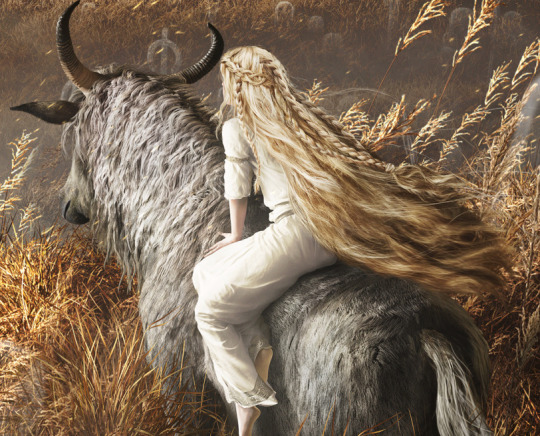
Of course this spawned many theories, one of the most well known and popular being that Miquella is torrent's former master, the very same one mentioned by Ranni that supposedly delivered the spirit calling bell onto her. Now of course this is all very interesting, as if proven true it means that Miquella did some serious planning ahead, it would also mean that Miquella would be aware of Marika's plan involving the tarnished, at least to some degree. Yet of course i have to still temper my expectations as concept art of Miquella riding torrent isnt exactly hard proof, at least not yet, the dlc announcement showed us a new cover art for the dlc and a much more fleshed out enviroment which looks pretty different from the original announcement, so i wouldnt be surprised if torrent was there for scale rather than hinting at a possible connection. Of course only time will tell...
Even so, lets assume Miquella is indeed Torrent's former master for a second. Because one of the DLC description line in the bandai page is pretty interesting...

Now why is this important? well first off i wanna get something out of the way, this line isnt exactly accurate to the original JP's text, where it says that Miquella is "awaiting the promised lord" so there is no mention of a "return" which makes more sense, now of course the lord in question would be us, the player, who is being guided by Miquella into the lands of shadow for some purpose yet unknown, but there is a chance that Miquella's hunt for a possible lord is something that has been going on for a while...

One of Elden ring's recurring themes is that of beasts following worthy lords, we see this a lot of times, Godfrey being one of the main examples, an elden lord accompanied by his regent beast Serosh. We also have placidusax, another elden lord who ruled over the beastmen. And of course we also have the shadowbound beasts that accompany and serve empyreans.
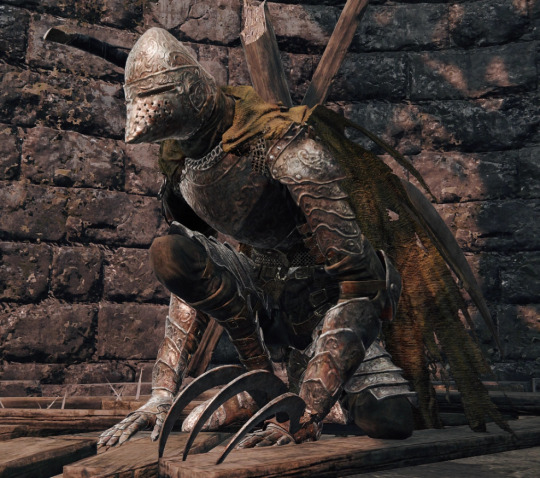
The bloodhound knights also carry on this particular themes, being knights that choose their own masters, and serve them for life. This part is important because it expands on the themes of Beasts choosing worthy lords.
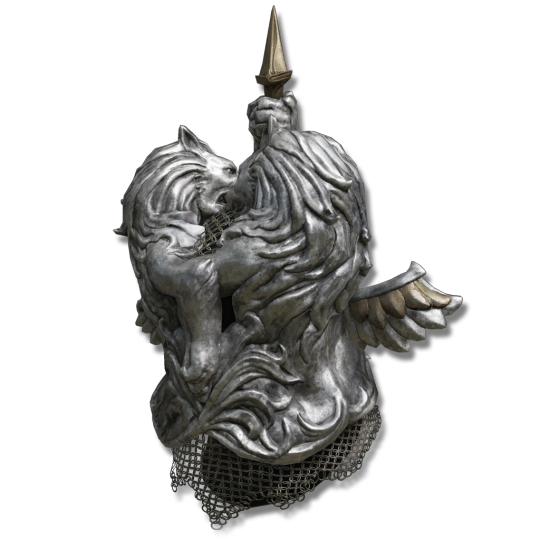
Finally there is the beast champion armor, that reads: Beasts are drawn to champions, and to lords. And this armor befits a champion worthy of becoming a lord. And that is what Bernahl was. which is again more of the same theme we have been over. So where does torrent fit into all this? well when we talk to Melina she tells us that "Torrent knew our measure from the very start".
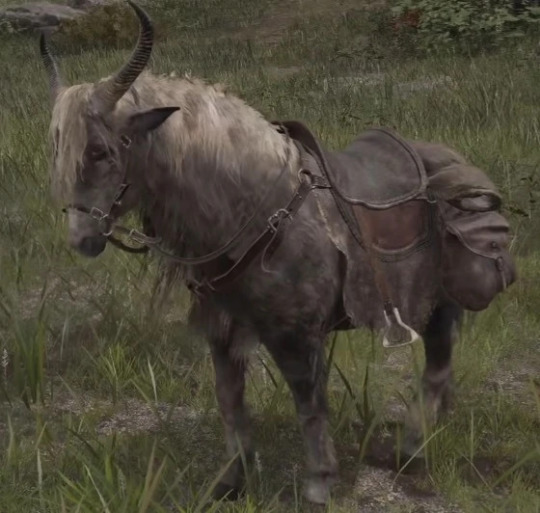
From the very beginning Torrent trusted us, he knew we were worthy of becoming lord and decided to follow us and help us achieve our goals, way before Melina truly trusted us. Torrent was our beast and we its lord. See were im going with this? If Miquella used to be Torrent's former master then i believe he was given away to look for a fitting lord, one who would help him carry out his vision. We are Miquella's promised lord. As another theme of elden ring is Lords being subservient to their god. Godfrey was loyal to Marika and carried out her will, placidusax also remained loyal to his god. So now we will become Miquella's lord and aid him in his quest.


I feel the fact that the item that summons torrent is a delicate goldwork ring is also telling of this, The lord that serves their god is usually also their consort. Much like we give ranni our ring to form our union, miquella might have given us this ring to brand us as their coming lord. It also would Make sense if Miquella was the creator of the ring, if he was torrent's former master then he knew a thing or two about spirits (because he entrusted the spirit calling bell onto ranni) and also he is described as a master craftsman, so he could have made the item that summons our spectral steed. its interesting to think about him working with Ranni as at the end of the day they have pretty different goals, one wanting to follow in his mother's footstepts and establish a new order while Ranni wanted to Make order inconcivable, removing it far away from mortal lives. Both being scheming little bastards however doesnt make it to difficult to believe that they would work together for their own personal benefit
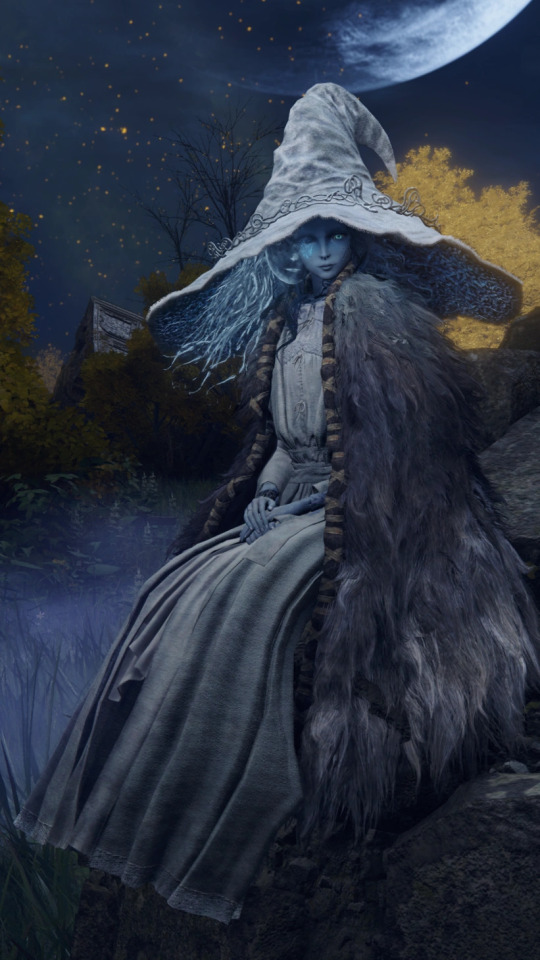
But anyway, those are my thoughts for now, i may expand upon it later but who knows. After all this is all WILDLY speculative and likely to be proven wrong when the dlc releases, yet i have hope that maybe some of it will be true!
#elden ring#miquella#miquella the unalloyed#elden ring dlc#elden ring ranni#ranni the witch#lunar princess ranni#shadow of the erdtree#elden ring lore#elden ring miquella
45 notes
·
View notes
Text
I HAVE NOT SEEN THIS MENTIONED YET AT ALL HELLO
I’ve been thinking about this nonstop since the episode came out so I wanna point it out in a long rant about it.
There’s a leitmotif in mammon’s musical episode! To clarify, a leitmotif is a recurring tune associated with a particular character or idea. This one in particular is an excellent musical representation of Fizz’s character growth, and I’d like to explain why, because I’ve been obsessed with this and I tear up every time I hear this theme. IT MAKES ME WANT TO CRY
The leitmotif plays thrice in the episode. The first two are the same track, while the third is a variation of it.
The first time:
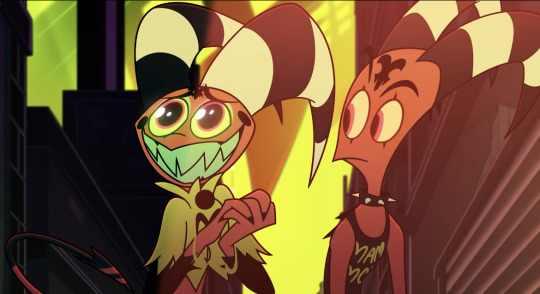
When Fizz is gushing about his passion and his dream to work with Mammon. There’s not much else going on, but Fizz is clearly in awe of his idol, as to be expected. He’s starstruck by the idea that he could have a chance to meet someone he admires so much. It’s a scene full of the wonder and excitement little Fizz encompasses.
And then the second:

When Fizz is communicating with the deaf fan! Oh god, oh god. I cried at this part, as I know a lot of people did too, because this part is so sweet and it’s so so important.
This is the reason Fizz kept doing his job. Because I think he realized that this fan looked up to him the same way Fizz did to Mammon. And, looking at him— the little guy has broken horns too. Just like Fizz.
Fizz sees himself in that kid.
Fizz has always wanted to put a smile on people’s faces, has always wanted to be the person kids look up to. And when he sees that happen, it’s probably what inspires him to keep going.
Now, what do these two instances have in common for the exact same track to play? I think that it’s a good emphasis on the kindness Fizz has when he’s a kid, and then, as an adult, the quieter gentleness underneath his stage persona.
Fizz is a kind person by nature, but the image that he has to maintain for Mammon’s brand is like— horniness and innuendos and sneering bravado cranked up to 11. So his audience never really sees the real side of him. The only time he gets to be more like himself is probably when a younger fan approaches him, which likely doesn’t happen a lot, considering the boatload of money you have to pay to even meet the performers, which I assume is added to what you’d have to scrape together to attend the event in the first place.
Another thing I noticed these two scenes have in common: The creepy fan’s appearance.
If you listen, Fizz’s leitmotif is overturned by an ominous shift in tone when the same obsessive fan shows up. I think it’s saying that even though there are undoubtedly positive experiences, they can very easily be overcome by the negative ones. Our brains are essentially hardwired to fixate on the negative experiences because of the possibility of the threat to safety. It wouldn’t be surprising if that’s what happened to Fizz.
Okay. Now, for the third and final time Fizz’s leitmotif plays:

Right after Fizz’s two minute notice. Right after he tells Mammon to go fuck himself.
This time, instead of the sweet and small melody with the subtle isolated instrumentation, it’s a fanfare. A full-force, fully orchestrated, trumpets blazing fanfare version of Fizz’s leitmotif. It’s kicking you right in the feels and it’s not hiding anymore.
It’s representing Fizz finally stepping into his own. Representing him standing up for himself. Representing his pride and his courage and him finally believing in his own self-worth.
And no one can tell me that it is pure coincidence that the music swells right at this moment.
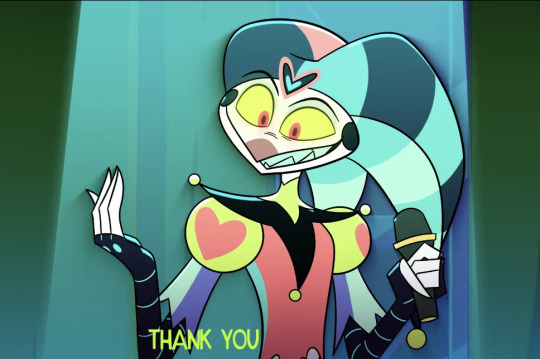
Another beautiful thing is that the music is indeed cut off, just like the prior two scenes mentioned, but it’s by Fizz himself.
It happens when he finally announces what he’s been wanting to do after so many years of being manipulated, abused, and controlled. And for once, the decision he makes is all of his own accord.
And that’s because of the sheer amount of self-confidence and the courage he’s built throughout this entire episode.
Isn’t that such a beautiful thing?
#fizzarolli#helluva boss#fizzaroli helluva boss#mammons magnificent musical mid season special#character development#character growth#people do NOT pay enough attention to how important music is you guys#they put so many itty bitty details in the background#small details#they always get me#i am sobbing
69 notes
·
View notes
Text
discussion #13 (only friends): 'fire' as a prominent and reflective symbol of topmew's relationship
this is so random, but i just realised that topmew's relationship has a lot to do with fire.
top's trauma, mew burning the drawing (we can really see how top flinches when the paper is caught on fire), another fire alarm set off (?) in the final ep, and their relationship (also their personality) in general.
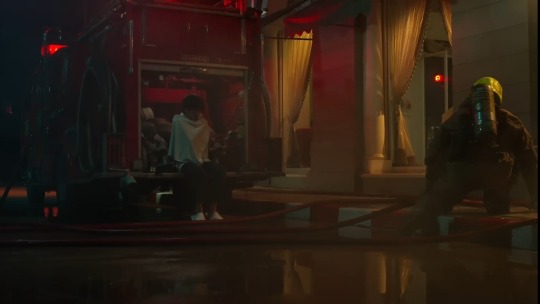
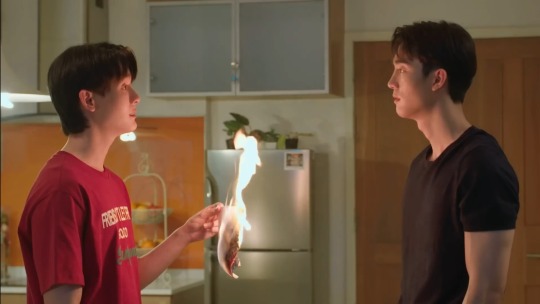

it's like their relationship (or mainly top's story arc) centres around the fire. the fire—in this context—varies. passion. fear. pain. love. sacrifice. i love how there's a connection between top's trauma and the nature/dynamic of their relationship. because even though top is afraid of fire—a traumatising turning point in his life—liking mew is like playing with fire, too. but he shows resilience, perseverance, and effort to make it work. although i do believe he's afraid of this new journey—he even said he couldn't bear the idea of not holding mew again one day—the feelings he has for mew surpass everything.
additionally, liking mew also gives top purpose. i think this is a recurring theme in some dramas i'm watching right now. kanghan from dangerous romance, for example, is becoming a better person after he meets sailom. because sailom has expectations on him—sailom believes in him. and it's similar to top. we know top dates for a maximum of three months (but one thing i realise is topmew have dated for four months because the drama starts in august, and since in the previous episode, mew helped his mothers hang the christmas ornaments, it's literally four months! mew is indeed special, and top is definitely serious in this relationship).
ok. i regress.
what i'm trying to say is, after meeting mew, knowing mew, falling in love with mew and losing mew, top finally found his purpose—he wants to make mew happy. it's the only thing he wants to do. and in episode 11, top said he wanted mew to believe he wouldn't take this second chance for granted. he would be better, for mew, for this relationship. why? because he loves mew. he loves mew. that's all there ever is.

(side note: this is the most heartbreaking thing about top, in my opinion. he just looks so peaceful and happy when he's with mew. it's really devastating. he can do anything to make mew happy—even if it causes him pain—and i somehow believe it's the humblest and most selfless definition of love: when we put someone's needs higher than ours. and top is doing just that and so much more for mew. so if i see anyone says top doesn't genuinely love mew, i'm going to fcuking cry tears of blood... t_t)
so ironically, top has been living 'with' the fire—mew—all this time. but he isn't running away. mew isn't something traumatising but life-changing. he's the 'fire' that top needs to realise and understand that love is real when it's with the right person. and mew is the right person for top. and vice versa; only top can put out the fire in mew.
mew is like the oil to top's fire. the more he pours himself on top, the brighter he burns. even though it's painful, it's still oddly beautiful. they're like the fire—destructive and dangerous. but they just can't walk away from each other's life. because the fire connecting them is none other than love.
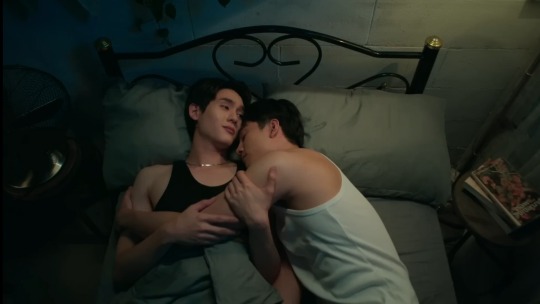
[1 | 2 | 3 | 4 (i) | 4 (ii) | 5 | 6 | 7 | 8 | 9 | 10 | 11 | 12 | 13]
#only friends#only friends series#only friends the series#ofts#only friends discussion#only friends meta#meta#discussion#analysis#top tanin#mew witsarut#topmew#force jiratchapong#book kasidet#forcebook#i wrote this while on the train to class hahaha#it's so out of nowhere#i apologise if this doesn't make sense though#but the song give my all to you is really giving me the angsty topmew feels#goodness#na discusses
55 notes
·
View notes
Text
It never ceases to baffle me how the fandom can use a certain logic to achieve one desired conclusion (see: MXTX wouldn't make an openly gay character in a homophobic world a harasser, so MXY hasn't actually harassed JGY) even if it goes against the text itself (MXY admitting in his diaries that he has harassed fellow Jin disciples) while the same logic doesn't work for them the other way around in the favor of the character they don't like (while MXTX would not do the aforementioned case, she would, however, make the character that is the son of a sex worker, and continuously discriminated against, considered dirty, belittled and ridiculed for it throughout the story a groomer who led a teenager MXY on so he could later accuse him of harassment) while this too, goes against the text (again, MXY admitting he has harassed someone in his diaries (he might have very well mentioned Jiggy in his diaries but not as Jin Guangyao, or Lianfang-Zun, Sect leader, or Xiandu or anything that WWX would know. but with the name MXY would call his older brother. maybe "ge" or something. then, if he had mentioned him in an inappropriate way, WWX wouldn't have made the connection that MXY was talking about his real brother), the text offering nothing to prove the contrary, JGY most likely wanting to avoid any rumors that would relate him to incest, the text going out of its way to give us info about JGY's nonexistent sex life in 3 different occasions, even though we had no business knowing about it, the first mention being literally in his introduction, when it's said that he's known for being extremely loyal to his wife, unlike other men in his position (showing us that he's traumatized by his father's behavior and would never repeat it), then at the Guanyin temple when he says that he's never touched QS after finding out the truth (if he's loyal to Qin Su, and hasn't touched QS for more than a decade, then by now he's essentially reset to factory settings and is a virgin again), then when his mother is offended again and Xue Yang offers that he should fuck the offenders' moms and JGY says that he's not in such habits and Xue Yang confirms that yes, that's not JGY's ways. Even when they're being openly villainous and have nothing to hide from each other. and I don't think it would be too much of a reach to think that a teenager in a brothel who looks notably like his mom and would be considered a "pretty boy" in ancient times with no child services would not be a stranger to nasty looks from grown men and thus would have trauma related to grooming.)
of course, the logic is flawed in general. Because MXY has allegedly committed harassment in one form or another and JGY did force a group of sex workers to rape his father to death, and then to continue even after his death, and then killed them all. Because the cycle of violence is one of the recurring themes in the book. And is broken by only a handful of characters, and even then in some of their cases not in all aspects.
And I won't even open the can of worms that is the Yunmeng Shuangjie. (because apparently, JC is toxic and bad for WWX even pre-time-skip because...he jokes around with his brother?...but WWX is not toxic and bad for JC when he jokes around with his brother? (this has a simple reason, and that is that nobody is toxic and bad for someone else due to joking around in a harmless way, especially among siblings.) And JC and WWX have a toxic relationship and can only break up because JC just keeps nagging WWX, while WWX causing trouble for JC & their sect every second of the day because he does whatever he wants and says whatever he wants in front of whoever he wants is not stressful for JC. (again, The Yunmeng bros themselves enjoy this dynamic. Or at least think the other parts of their relationship is worth putting up with these annoyances. WWX annoys JC every chance he gets and actively kickstarts JC's naggings. JC's life is dull and dark and boring without WWX's shenanigans and the dramas he causes. He himself thinks that having WWX in his life is worth the trouble. JC makes WWX more responsible, while WWX makes JC more carefree. they're good for each other.)
So as we saw, usually, when a certain logic doesn't work both ways it's because it's flawed. make sure to not use a certain logic in your determination to defend a character that should technically work for the character you hate, too.
#mdzs#CQL#the grandmaster of demonic cultivation#the untamed#modao zushi#tgod#jin guangyao#Meng yao#mo xuanyu#jiang cheng#wei wuxian#jiang wanyin#wei ying#twin prides of yunmeng#yunmeng bros#yunmeng shuangjie#my two cents
118 notes
·
View notes
Text
Trevor Herbert: Addiction, Clarity, and Drive
I’m participating in @a-mag-a-day, and decided to express some of my thoughts on the progression of Trevor Herbert’s characterization. The next thing I knew, I had an essay.
Over the course of The Magnus Archives, one of the most interesting recurring secondary characters is Trevor Herbert, the homeless vampire hunter. Over the course of his appearances and statements, a rough timeline can be drawn comparing his overall stability over time. This essay will be ignoring his last appearances, most notably his attack on the institute at the end of season 4 and his brief moment in season 5, in favor of a deeper look at Trevor’s motivations and characterization over time. The resounding theme of his character is that steadfast dedication to a cause, whether that cause is morally right or not, can lead to personal improvement for those devoting themselves to it.
To make sense of what was an admittedly overgeneralized and cryptic claim, let’s look through Trevor’s timeline and compare his psychological state in each appearance. Trevor Herbert, like many other secondary characters from Magnus, features in multiple statements spread out over the course of several seasons. Other important minor characters, such as Jared Hopworth, Agnes Montague, and Adelard Dekker, are also introduced in this fashion. Trevor’s appearances, however, are mostly in some form of chronological order, and we have not one but three statements given by the man himself, which allow us, the listeners, a relatively easy look into his mind.
The first statement he appears in is Mag 10: Vampire Killer. Trevor describes his early years first encountering vampires, as well as his experiences being homeless. The first half covers fleeing from an abusive home with his brother Nigel, and Nigel’s subsequent death at the hands of a vampire. This first encounter is heavily interspersed with digressions about later learned facts on the nature of vampires, comparing his knowledge at the time of the first encounter with his knowledge now. This provides us with several important pieces of information. Firstly, Trevor is both smart enough and experienced enough to define general rules for vampire behavior and abilities. Secondly, he’s interested in sharing that information. He states or implies several times in this first statement that he intends for it to become reference material for all those looking to hunt vampires themselves; later evidence suggests that that was very much the case: his statement has been viewed many times by members of the police, and section 31’s vampire policy is clearly influenced by Trevor’s experience and advice.
The second half of the statement shows the beginning of Trevor’s decline. Between his first and second vampire encounter, he almost convinced himself that he was seeing things, became addicted to heroin, and remained homeless. It was only a chance encounter with another vampire that got him firmly on the path of a vampire hunter.
Here, similarly to the journeys of several other avatars or statement givers, we see the motif of the second encounter. Some people had only one encounter with the supernatural, and generally managed to dismiss it, returning to their normal, comfortable lives. The second encounter marks a turning point, where the unfortunate victim can either turn around and leave again or embrace the danger and dig themselves deeper; Melanie King is a prime example of this, but so is Trevor. He chooses to follow the vampire and save its victim, thus beginning his personal journey to becoming an avatar of the Hunt.
In the second installment of the same statement, featured in Mag 56: Children of the night, picks up after a large gap in which Trevor has both killed several more vampires, and deteriorated significantly. His heroin addiction, previously just mentioned in passing as what caused a vampire to stop biting him, has become much more debilitating. He is also beginning to show a physical dependence on the Hunt: thinking less clearly between hunts, and less dependent on the extensive vetting system he used in the past. It is only accidentally killing someone who was not, in fact, a vampire, that causes the shock to his system that brings Trevor the clarity he needs to understand what he is Becoming (and clearly by this point capital letters are necessary). This leads him into an even worse downwards spiral, where we can see more and more traces of the Hunt’s influence and interference. His addiction becomes worse and worse, and he says “It’s a wonder I never overdosed at any point”, which was likely due to the Hunt keeping him alive.
It is generally accepted that the full Becoming of an avatar requires a literal or symbolic death. The avatar is offered a choice: to die, or to continue living as someone else with full dependence and loyalty to their power of choice. It’s generally accepted that for Trevor this tipping point was when he failed to die of stomach cancer in the institute breakroom, but it’s more likely his symbolic death took place somewhere in these hazy years, right before he made the final decision to get up and keep hunting. He encounters an avatar of the Web, realizes that there’s more than just vampires hiding in the dark, makes his statement, and then leaves the institute, most likely not aware that his stomach cancer is no longer capable of killing him.
The next turning point in Trevor’s life is when he meets Julia Montauk, his hunting companion and, later, adopted daughter. In the statement given jointly by Trevor and Julia, we can see that both when they met and when they gave this statement, Trevor had a clarity of thought and strength of body not seen earlier. His aging has slowed considerably, and he appears to no longer be using heroin. The Hunt has clearly had an influence, and Trevor is a particular favorite of it. In addition, he and Julia have more money, a car, greater knowledge of different types of monsters, and are in possession of The Catalog of the Trapped Dead, containing several ghosts, most notably Gerad Keay.
When Jon meets Trevor and Julia in America, Trevor is still rugged. He’s still old. He’s still violent. But embracing the Hunt and gaining a partner to Hunt with have given him an unbridled ability to think clearly and display the intelligence, instincts, and judgment we only saw hints of in earlier statements.
There is both in-universe and real-life precedent for this. Acquiring a cause, giving yourself a purpose, can help an individual with personal struggles. We see many avatars who achieve self-actualization after embracing their god; Trevor is no exception. It’s not clear how much he consciously considers himself a servant of the hunt, but he clearly is, and that was the best option he could have taken for his personal growth and development.
#tma#the magnus archives#literary analysis#long post#tma essay#tma spoilers#trevor herbert#mag 10#mag 56#character analysis#tma relisten#a mag a day
62 notes
·
View notes
Text
Who says we have to let it go? (a season 4 reflection)
As promised, I finished rewatching the show in full one more time, so now I will finally put my S4 thoughts to paper (or screen). Coincidentally, this is also the day that the series finale would've dropped if S4 was released weekly, so it feels fitting to write this today, anyway.
Even after the initial Rina fog has lifted and excitement has died down, season 4 still remains my favorite season. While it has plenty of issues with plotting (certainly more than s3 or s1), it absolutely nails it thematically. The season explores the importance and consequences of vulnerability, and the power of seeing others as they truly are (as I mentioned in an older post, it's all about vulnerability and authenticity), and every main character's storyline so beautifully contributes to those themes in unique ways. There's also a really interesting dynamic between looking to the future and holding onto the present being explored this season, and I think the glamor of HSM4 (a hollywood movie) and the humility of HSM3 (a high school play) are symbolic of each respective idea. There's actually a lot I want to discuss about each character's relationship with both HSM4 and HSM3, and how it succinctly shows their internal feelings about their futures, but maybe that's for another time. Anyway, Tim has said his intention for the show's thesis is to find people who see and accept you for who you are, but this last season goes so much deeper with that concept, emphasizing the necessity of letting yourself be seen and known, too. This can be through letting your walls down, letting your flaws and struggles be seen, choosing to forgive those you love and take a second chance, or boldly speaking what's in your heart. Nearly every original song this season touched on this theme in some way, which really emphasizes the thematic cohesion of this season.
This leads me to the music, which is the best it's ever been in the show. Every single one of the originals is so good, and I love that there was also (finally) a showtune in a traditional musical theater style ("Over Again")! However, the score is what really stuck out to me this season (HUGE shoutout to Gabriel Mann, the scorer of the show). I do think the scoring of S3 really started to assist with telling the story by including more recurring leitmotifs (I think the return of the Rina cue helped), but the score of S4 really leans into this aspect of storytelling, especially in the final 2 episodes. There's leitmotifs to represent Shallow Lake, a magical motif from "Dreams Don't Die" to represent the magical and fleeting nature of high school theater, countless variations of the Rina cue, and I'm pretty sure there's even a recurring leitmotif established for Kourtney (I have to go back and listen for if it's used beyond her scenes).
Another thing that really stuck out to me was how well each episode was written. I think overall, there are leaps between some episodes that don't feel natural, but the story of each episode is well constructed and executed. There's genuinely not a single episode this season that I would say is boring or pointless... certainly some plotlines throughout the season turn out to be, but the episodes themselves are solid. Unfortunately, some of the plotlines this season feel like they end really abruptly, which did feel jarring on a first (and second) watch. I do believe Bart Johnson when he said some stuff for HSM4 was cut, because I was surprised at how little the OGs were in this season. Same can be said for Dani's storyline, which really felt superfluous in the end result. I hope that there's a showrunner's/extended cut released of this show someday, because that would probably fix those issues.
Overall, with this being the last season, it had the most important job of closing the show out in a truly complete way. I really believe it competently did that job, and I think how it finished the growth of the lead characters is what makes it conclusion so poignant. Everyone will have their opinions on how the show handled certain characters, but how Ricky and Gina (and even EJ, to a lesser extent) were handled in this last season absolutely tells me these writers knew what they were doing with these characters. The last series finale I watched that concluded character arcs so resolutely, with such tremendous humanity and truth, was Lost (Jack Shephard's arc is one of the most complete and profound I've ever seen). Gina Porter has always been a character I related to deeply, and that final season really made my connection with her even more personal and heartfelt. I actually have experienced healing of some wounds of my younger self witnessing her story, and I see how much more growing and healing I still have left.
So, what's the sum of my thoughts on season 4? I wouldn't change a thing! Ok, that's not necessarily true, but I still love it as it is. It was the funniest season (seriously, every single joke was hilarious), it was the most heartfelt, it was thematically rich, and it helped me say goodbye to the wildcats, while still holding onto hope for a bit more.
#hsmtmts#high school musical the musical the series#hsmtmts season 4#Gina Porter#Ricky Bowen#EJ Caswell#I still have more thoughts I can share#so hopefully this fandom stays alive so I can do that in due time
15 notes
·
View notes
Text
Regis Philbin Teaches Computers In His New Book.
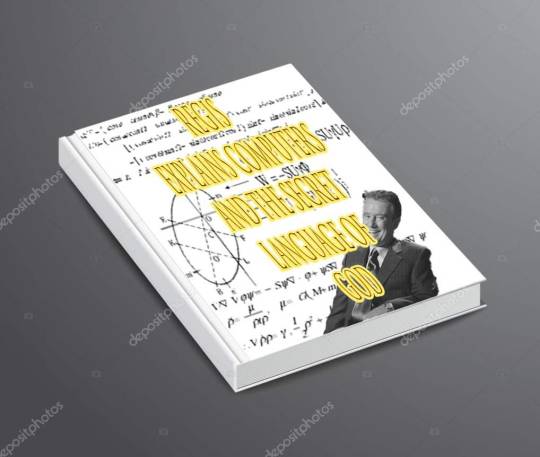
"So the first time I got on the computer, my niece was showing me how to set up an e-mail, back in the 90s, this must have been 1996, 1997. And I thought, great, saves me a stamp. But she said, Uncle Regis, it's so much more than just e-mail. You can look up stock quotes. You can order flowers. You can research the rainforest. So I thought, heck, that's not bad. And I can do all this, through my phone line? She said, just you wait. One day, you won’t even need a phone. She’s always been so sharp, my niece.”
"I remember when I discovered chat rooms. I went in one under my screen name, BIG_PHRANCIS_X, totally pseudonymous, and I thought, wow, this is true freedom. The World Wide Web, at my fingertips, and no expectations, no one knows its me. I can surf anywhere. I can say anything. I had a great discussion with some folks that first time, talking about video games, which was better, the Sega or the Nintendo. I didn’t have an opinion. No idea! Then a man sent me some sexual chats, talking about his power tools and so on, and so I skedaddled.”
“My first webpage I visited was a hoot. The way it worked was, you put in your name at the top, or any name, I suppose, and it generated a fake doctor’s excuse for you. Really outrageous stuff — “acute case of Sunday hangover,” or “Got bit by a llama,” that kind of nonsense. Who comes up with this stuff? I would go to that site, every day for about a month, first thing, right with my morning coffee.”
“Eventually, I went to a second webpage, website, whatever. It was a repository of stories that this man, a European I believe, had written. Long, really detailed fiction, lots of plots, but the general recurring theme was that a woman would end up sitting on him, or rather, the main character, who always seemed to be about the same type of European male, and the woman would use the main character as a chair, of sorts. Sometimes a stool, sometimes a bench. The women varied — tall, short, mean, kind, fat, thin, all sorts of women just using this guy as a chair. Sometimes they’d be drinking wine, sometimes reading a book. I didn’t realize it at the time but I think this guy really got his jollies from it. I guess that’s one of the purposes of fiction, to let us imagine the world as it could be, and this guy, I guess, he just wished he had been born as a chair.”
“Eventually I started racking up the pages. Dozens of web pages, hundreds even. I ordered more flowers, that first year, than Joy knew what to do with. “Reg,” she’d say, “more flowers?!” hollering back to the computer room whenever the delivery guy would show up. I also learned a whole lot about the rain forest, information I still rely on to this day.”
“But then, one night, I couldn’t sleep, and I was up, surfing the web. And I found a new web page I’d never seen before. It was written in riddles, long, recursive sentences, and when I’d go back to read the opening part, I swore it was changing.”
“The topic was vague, hard to understand. It touched on many things — pain, loss, love, triumph, fear, sex, death, the ego, the id — there was embedded music, a haunting leitmotiv played on an electric keyboard — it was a winding narrative, water down an escarpment, and the water came from a machine, an automatic author, a robot of sorts, it seemed mournful, a helper looking for someone it had lost, another script, another automaton, knowing only how to describe the world through its medium, maybe it was telling me the story as I read it.”
“I scrolled, and read, and scrolled, and read, and there, at the bottom of the page, I met God. I could recognize God, as a word, of sorts. God was a series of letter forms, glyphic, immutable, conveying nothing, conveying everything. God was a cursor. God was a scroll bar. God was script that helped track my visit. God was a broken image link. God was the embedded song that played on loop. God was the banner ad, loading at the bottom. God was offering a chance for me to click here for a free iPod, years before the advent of the iPod. God was not dissuading me, God was not encouraging me. I do not know if I have free will, I do not know if I am forsaken. I did not click to try to win that iPod.”
"Do you believe that? Do you believe God is at the bottom of a website? I believed it then, and I still do.”
Regis Weekend Has Been Extended Through Saturday, September 16.
9 notes
·
View notes
Text
Finally another man is telling men who want to be in a relationship with women to be better and stop blaming women for rejecting them.
KEY POINTS
Dating opportunities for heterosexual men are diminishing as healthy relationship standards change.
Men represent approximately 62% of dating app users, lowering their chances for matches.
Men need to address skills deficits to meet healthier relationship expectations.
Younger and middle-aged men are the loneliest they’ve ever been in generations, and it’s probably going to get worse.
This is not my typical rosy view of relationships but a reality nonetheless. Over the last 30 years, men have become a larger portion of that growing group of long-term single people. And while you don’t actually need to be in a relationship to be happy, men typically are happier and healthier when partnered.
Here are three broad trends in the relationship landscape that suggest heterosexual men are in for a rough road ahead:
Dating Apps. Whether you’re just starting to date or you’re recently divorced and dating again, dating apps are a huge driver of new romantic connections in the United States. The only problem is that upwards of 62% of users are men and many women are overwhelmed with how many options they have. Competition in online dating is fierce, and lucky in-person chance encounters with dreamy partners are rarer than ever.
Relationship Standards. With so many options, it’s not surprising that women are increasingly selective. I do a live TikTok show (@abetterloveproject) and speak with hundreds of audience members every week; I hear recurring dating themes from women between the ages of 25 and 45: They prefer men who are emotionally available, good communicators, and share similar values.
Skills Deficits. For men, this means a relationship skills gap that, if not addressed, will likely lead to fewer dating opportunities, less patience for poor communication skills, and longer periods of being single. The problem for men is that emotional connection is the lifeblood of healthy, long-term love. Emotional connection requires all the skills that families are still not consistently teaching their young boys.
While there’s probably no chance of stemming the rising tide of unintentional single men, there is still good news.
The algorithms are becoming increasingly more complex on dating apps and other online platforms. One benefit is that great matches are on the rise. Hinge, one dating app, found through beta trials that 90% of users rated their first date positively, with 72% indicating wanting a second date.
How can men reap the benefit of the algorithms? Level up your mental health game. That means getting into some individual therapy to address your skills gap. It means valuing your own internal world and respecting your ideas enough to communicate them effectively. It means seeing intimacy, romance, and emotional connection as worthy of your time and effort.
Ultimately, we have an opportunity to revolutionize romantic relationships and establish new healthy norms starting with a first date. It’s likely that some of these romances will be transformative and healing, disrupting generational trauma, and establishing a fresh culture of admiration and validation.
Men have a key role in this transformation but only if they go all-in. It’s going to take that kind of commitment to themselves, to their own mental health, to the kind of love they want to generate in this world. Will we step up?
By

“Younger and middle-aged men are the loneliest they’ve ever been in generations”. Who would have thought that the generations of men raised with early access to porn, and sicker porn than was available to generations before, and addiction to game ing would have trouble keeping a relationship.
So glad he’s not another man blaming women for being to demanding instead of just accepting that so many of today’s men are not relationship material.
9 notes
·
View notes
Text
"Your Entourage: For Vinces Part I" by David Pailin Jr.
Based loosely on the life and experiences of Mark Wahlberg, The Entourage is the ultimate story of brotherhood, success, and struggle. Outside of the outlandish lifestyle and hilarious situations, there are critical lessons that The Entourage speaks to that it’s important that men everywhere internalize. We’ve developed this series called “Your Entourage” to share some of these gems.
Characters
Vincent "Vince" Chase played by Adrian Grenier
The Main focus of the show, Vince is effectively Mark who has moved from Queens, NY with his buddies to LA to pursue his acting career.
Eric "E" Murphy played by Kevin Connolly
E is Vince’s childhood best friend who goes on to be Vince’s manager
Ari Gold played by Jeremy Piven
Ari is a Hollywood heavyweight that joins on to be Vince’s agent
Johnny "Drama" Chase played by Kevin Dillon
Drama is Vince’s older brother who has had some success as a child actor.
Turtle played by Jerry Ferrara
Turtle is another close friend of Vince who is basically his assistant, taking care of the small and large requests that he has.
Know Your Role
One of the recurring themes in The Entourage is everyone’s struggle to understand and make peace with their role within the group, and this is probably best done by Vince.
Vince is literally the star of the show and the main source of income, so he is constantly making judgment calls between friends and paid professionals. He’s a genuinely humble and generous guy, but as he gains more fame he has to come to the sobering reality that he is the main attraction and will need to move accordingly.
Vince is a fictional character but Drake and Lebron are real-life examples of Vince’s who understand they are in a unique situation to bring their friends and family to another level of stardom and success, but it all depends on their ability to execute on the main thing.
For anyone in Vince’s shoes, it’s important that your decisions and behavior don’t jeopardize the career that brought everyone to the big stage in the first place. It’s equally important that you embrace your role with confidence and don’t feel guilty about your position in the entourage. Your leadership is needed in times of success and failure, as any confusion on your top priority will lead to conflict, missed opportunity, and resentment.
In one particular episode, another childhood friend of Vince pops up out of nowhere and invites himself to join the entourage. He’s fresh out of jail and aggressively stepping on the toes of all of the other entourage members, but it’s not until he steals the personal belongings of a very important studio exec that Vince is forced to make the decision to cut him off. Throughout the episode, there were signals of problematic behavior, but it wasn’t until his livelihood was threatened did Vince act. Unfortunately, we don’t always get the second chance to make things right like Vince, so it’s critical to assess how your role extends into the company you keep and introduce to mixed audiences.
Knowing your role goes beyond the limitations of your entourage. Regardless of the group dynamic, you are the star of your life and at any time that you don’t like the story that is being written, you can change scenes, settings, and the story arc. Keep this in mind as you sign up for any roles
2 notes
·
View notes
Text
"Your Entourage: For Vinces Part I" by David Pailin Jr.
Based loosely on the life and experiences of Mark Wahlberg, The Entourage is the ultimate story of brotherhood, success, and struggle. Outside of the outlandish lifestyle and hilarious situations, there are critical lessons that The Entourage speaks to that it’s important that men everywhere internalize. We’ve developed this series called “Your Entourage” to share some of these gems.
Characters
Vincent "Vince" Chase played by Adrian Grenier
The Main focus of the show, Vince is effectively Mark who has moved from Queens, NY with his buddies to LA to pursue his acting career.
Eric "E" Murphy played by Kevin Connolly
E is Vince’s childhood best friend who goes on to be Vince’s manager
Ari Gold played by Jeremy Piven
Ari is a Hollywood heavyweight that joins on to be Vince’s agent
Johnny "Drama" Chase played by Kevin Dillon
Drama is Vince’s older brother who has had some success as a child actor.
Turtle played by Jerry Ferrara
Turtle is another close friend of Vince who is basically his assistant, taking care of the small and large requests that he has.
Know Your Role
One of the recurring themes in The Entourage is everyone’s struggle to understand and make peace with their role within the group, and this is probably best done by Vince.
Vince is literally the star of the show and the main source of income, so he is constantly making judgment calls between friends and paid professionals. He’s a genuinely humble and generous guy, but as he gains more fame he has to come to the sobering reality that he is the main attraction and will need to move accordingly.
Vince is a fictional character but Drake and Lebron are real-life examples of Vince’s who understand they are in a unique situation to bring their friends and family to another level of stardom and success, but it all depends on their ability to execute on the main thing.
For anyone in Vince’s shoes, it’s important that your decisions and behavior don’t jeopardize the career that brought everyone to the big stage in the first place. It’s equally important that you embrace your role with confidence and don’t feel guilty about your position in the entourage. Your leadership is needed in times of success and failure, as any confusion on your top priority will lead to conflict, missed opportunity, and resentment.
In one particular episode, another childhood friend of Vince pops up out of nowhere and invites himself to join the entourage. He’s fresh out of jail and aggressively stepping on the toes of all of the other entourage members, but it’s not until he steals the personal belongings of a very important studio exec that Vince is forced to make the decision to cut him off. Throughout the episode, there were signals of problematic behavior, but it wasn’t until his livelihood was threatened did Vince act. Unfortunately, we don’t always get the second chance to make things right like Vince, so it’s critical to assess how your role extends into the company you keep and introduce to mixed audiences.
Knowing your role goes beyond the limitations of your entourage. Regardless of the group dynamic, you are the star of your life and at any time that you don’t like the story that is being written, you can change scenes, settings, and the story arc. Keep this in mind as you sign up for any roles
3 notes
·
View notes
Photo
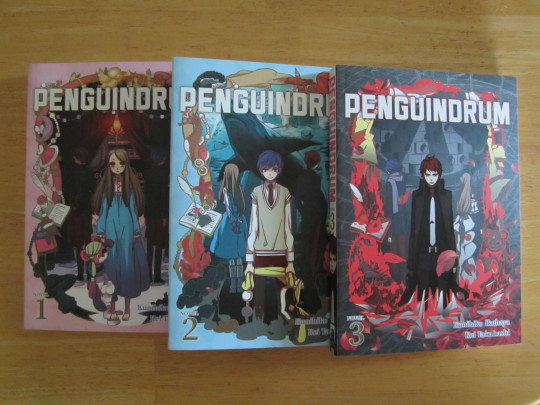
Penguindrum is a story about a terminally ill young girl who, after dying, is granted a second chance at life by a possessed penguin hat that her brothers had purchased for her at the aquarium. In return for this gift of life, the brothers - and the penguins who now follow all three siblings - are tasked with retrieving the titular penguindrum - else the girl will die again.
This summary does not even scratch the surface of what actually transpires in these books. They are the novilisation of an anime; and, while I am familiar with anime luring you in with a somewhat weird premise and cute creatures only to hit you over the head with sad moments and dark themes - I still was unprepared for how bizarre and heavy this series gets.
The series deeply explores the themes of what it means to be family, which ties into its recurring theme of ‘invisible children’ - the children that society tends to ignore, overlook, or straight up toss aside. In this case, it focuses specifically on children whose parents perpetrated the 1995 Sarin Gas Attack, as well as several others who had some connection to one of the victims, and the relationships between all those affected by the attack.
This subject is especially well-handled since, despite never shying away from keeping the awfulness of the parents’ actions in perspective, the series also shows the parents, through flashbacks, as their children saw them - as kind, loving, protective parents. The lens of violence and fear through which the world views their parents is not that through which the children view them because their parents never showed them that side of themselves.
Another common theme is that of childhood trauma at the hands of their guardians and society. Each of the children presented here has suffered in some way, and series explores how that trauma has effected them, pushing some of them, in some cases, to violent extremes. Those extremes can be difficult to read on occasion, but are never romanticised or excused.
Admittedly, this does make the book a dismal read in parts. (Don’t even get me started on San-chan. As if the series wasn’t depressing enough, they had to throw that at me.) However, the lighter and more comedic moments are numerous and warmly welcomed. This does mean that the series periodically gives its reader tonal whiplash which, while I would ordinarily argue is a flaw, actually benefits the story, since the subject matter and themes are so heavy.
I appreciate that the terminally ill Himari is a fully developed character with dreams, doubts, and flaws, as opposed to being the archetypically “pure and perfect fragile child” whose character and illness exist solely to drive the plot forward. While she is introduced as pure, innocent, and childlike, it becomes apparent rather quickly that there is more to her than that and that those characteristics may be a mask she wears for her and her brothers’ sakes. As is typical of many anime, the characters appear simple on the surface only to have it revealed later that they have many deeper (and in this series, often darker) layers.
Of course, there are a few areas in which the series could have been improved. Noticeably in the second book, though more egregiously in the third, the penguins that are constantly present in the background, especially No. 1 and 2, are frequently omitted. While I would ordinarily assume this is intended to by symbolic in some way, I am aware that, in the anime, they’re still present, making their sudden omission feel as though Ikuhara just got bored with describing their background antics and gave up doing so. Similarly, it is a shame that the second penguin hat has almost zero bearing on the story beyond explaining a certain character’s motivation and actions. Himari’s relationship with hers is repeatedly depicted and explored, so it feels like wasted potential to not do so with the second hat even just once. Finally, while I’m aware that the suggested incest in the series is not actually incest (which is all I can say without spoiling anything), I believe the story suffers from its suggestion. The character dynamics work best and service the overall themes of the story best when they’re strictly familial. The story makes it clear that these characters see each other as family and, for that reason alone, will do anything for one another, and even hinting at any romantic interest between any of them cheapens that a little.
Overall, if you are not bothered by a heavy and, at times, outright heartbreaking story, then I recommend reading this series. It offers so much more than its premise promises.
5 notes
·
View notes
Text
"Your Entourage: For Vinces Part I" by David Pailin Jr.
Based loosely on the life and experiences of Mark Wahlberg, The Entourage is the ultimate story of brotherhood, success, and struggle. Outside of the outlandish lifestyle and hilarious situations, there are critical lessons that The Entourage speaks to that it’s important that men everywhere internalize. We’ve developed this series called “Your Entourage” to share some of these gems.
Characters
Vincent "Vince" Chase played by Adrian Grenier
The Main focus of the show, Vince is effectively Mark who has moved from Queens, NY with his buddies to LA to pursue his acting career.
Eric "E" Murphy played by Kevin Connolly
E is Vince’s childhood best friend who goes on to be Vince’s manager
Ari Gold played by Jeremy Piven
Ari is a Hollywood heavyweight that joins on to be Vince’s agent
Johnny "Drama" Chase played by Kevin Dillon
Drama is Vince’s older brother who has had some success as a child actor.
Turtle played by Jerry Ferrara
Turtle is another close friend of Vince who is basically his assistant, taking care of the small and large requests that he has.
Know Your Role
One of the recurring themes in The Entourage is everyone’s struggle to understand and make peace with their role within the group, and this is probably best done by Vince.
Vince is literally the star of the show and the main source of income, so he is constantly making judgment calls between friends and paid professionals. He’s a genuinely humble and generous guy, but as he gains more fame he has to come to the sobering reality that he is the main attraction and will need to move accordingly.
Vince is a fictional character but Drake and Lebron are real-life examples of Vince’s who understand they are in a unique situation to bring their friends and family to another level of stardom and success, but it all depends on their ability to execute on the main thing.
For anyone in Vince’s shoes, it’s important that your decisions and behavior don’t jeopardize the career that brought everyone to the big stage in the first place. It’s equally important that you embrace your role with confidence and don’t feel guilty about your position in the entourage. Your leadership is needed in times of success and failure, as any confusion on your top priority will lead to conflict, missed opportunity, and resentment.
In one particular episode, another childhood friend of Vince pops up out of nowhere and invites himself to join the entourage. He’s fresh out of jail and aggressively stepping on the toes of all of the other entourage members, but it’s not until he steals the personal belongings of a very important studio exec that Vince is forced to make the decision to cut him off. Throughout the episode, there were signals of problematic behavior, but it wasn’t until his livelihood was threatened did Vince act. Unfortunately, we don’t always get the second chance to make things right like Vince, so it’s critical to assess how your role extends into the company you keep and introduce to mixed audiences.
Knowing your role goes beyond the limitations of your entourage. Regardless of the group dynamic, you are the star of your life and at any time that you don’t like the story that is being written, you can change scenes, settings, and the story arc. Keep this in mind as you sign up for any roles
1 note
·
View note
Text
"Your Entourage: For Vinces Part I" by David Pailin Jr.
Based loosely on the life and experiences of Mark Wahlberg, The Entourage is the ultimate story of brotherhood, success, and struggle. Outside of the outlandish lifestyle and hilarious situations, there are critical lessons that The Entourage speaks to that it’s important that men everywhere internalize. We’ve developed this series called “Your Entourage” to share some of these gems.
Characters
Vincent "Vince" Chase played by Adrian Grenier
The Main focus of the show, Vince is effectively Mark who has moved from Queens, NY with his buddies to LA to pursue his acting career.
Eric "E" Murphy played by Kevin Connolly
E is Vince’s childhood best friend who goes on to be Vince’s manager
Ari Gold played by Jeremy Piven
Ari is a Hollywood heavyweight that joins on to be Vince’s agent
Johnny "Drama" Chase played by Kevin Dillon
Drama is Vince’s older brother who has had some success as a child actor.
Turtle played by Jerry Ferrara
Turtle is another close friend of Vince who is basically his assistant, taking care of the small and large requests that he has.
Know Your Role
One of the recurring themes in The Entourage is everyone’s struggle to understand and make peace with their role within the group, and this is probably best done by Vince.
Vince is literally the star of the show and the main source of income, so he is constantly making judgment calls between friends and paid professionals. He’s a genuinely humble and generous guy, but as he gains more fame he has to come to the sobering reality that he is the main attraction and will need to move accordingly.
Vince is a fictional character but Drake and Lebron are real-life examples of Vince’s who understand they are in a unique situation to bring their friends and family to another level of stardom and success, but it all depends on their ability to execute on the main thing.
For anyone in Vince’s shoes, it’s important that your decisions and behavior don’t jeopardize the career that brought everyone to the big stage in the first place. It’s equally important that you embrace your role with confidence and don’t feel guilty about your position in the entourage. Your leadership is needed in times of success and failure, as any confusion on your top priority will lead to conflict, missed opportunity, and resentment.
In one particular episode, another childhood friend of Vince pops up out of nowhere and invites himself to join the entourage. He’s fresh out of jail and aggressively stepping on the toes of all of the other entourage members, but it’s not until he steals the personal belongings of a very important studio exec that Vince is forced to make the decision to cut him off. Throughout the episode, there were signals of problematic behavior, but it wasn’t until his livelihood was threatened did Vince act. Unfortunately, we don’t always get the second chance to make things right like Vince, so it’s critical to assess how your role extends into the company you keep and introduce to mixed audiences.
Knowing your role goes beyond the limitations of your entourage. Regardless of the group dynamic, you are the star of your life and at any time that you don’t like the story that is being written, you can change scenes, settings, and the story arc. Keep this in mind as you sign up for any roles
1 note
·
View note
Text
"Your Entourage: For Vinces Part I" by David Pailin Jr.
Based loosely on the life and experiences of Mark Wahlberg, The Entourage is the ultimate story of brotherhood, success, and struggle. Outside of the outlandish lifestyle and hilarious situations, there are critical lessons that The Entourage speaks to that it’s important that men everywhere internalize. We’ve developed this series called “Your Entourage” to share some of these gems.
Characters
Vincent "Vince" Chase played by Adrian Grenier
The Main focus of the show, Vince is effectively Mark who has moved from Queens, NY with his buddies to LA to pursue his acting career.
Eric "E" Murphy played by Kevin Connolly
E is Vince’s childhood best friend who goes on to be Vince’s manager
Ari Gold played by Jeremy Piven
Ari is a Hollywood heavyweight that joins on to be Vince’s agent
Johnny "Drama" Chase played by Kevin Dillon
Drama is Vince’s older brother who has had some success as a child actor.
Turtle played by Jerry Ferrara
Turtle is another close friend of Vince who is basically his assistant, taking care of the small and large requests that he has.
Know Your Role
One of the recurring themes in The Entourage is everyone’s struggle to understand and make peace with their role within the group, and this is probably best done by Vince.
Vince is literally the star of the show and the main source of income, so he is constantly making judgment calls between friends and paid professionals. He’s a genuinely humble and generous guy, but as he gains more fame he has to come to the sobering reality that he is the main attraction and will need to move accordingly.
Vince is a fictional character but Drake and Lebron are real-life examples of Vince’s who understand they are in a unique situation to bring their friends and family to another level of stardom and success, but it all depends on their ability to execute on the main thing.
For anyone in Vince’s shoes, it’s important that your decisions and behavior don’t jeopardize the career that brought everyone to the big stage in the first place. It’s equally important that you embrace your role with confidence and don’t feel guilty about your position in the entourage. Your leadership is needed in times of success and failure, as any confusion on your top priority will lead to conflict, missed opportunity, and resentment.
In one particular episode, another childhood friend of Vince pops up out of nowhere and invites himself to join the entourage. He’s fresh out of jail and aggressively stepping on the toes of all of the other entourage members, but it’s not until he steals the personal belongings of a very important studio exec that Vince is forced to make the decision to cut him off. Throughout the episode, there were signals of problematic behavior, but it wasn’t until his livelihood was threatened did Vince act. Unfortunately, we don’t always get the second chance to make things right like Vince, so it’s critical to assess how your role extends into the company you keep and introduce to mixed audiences.
Knowing your role goes beyond the limitations of your entourage. Regardless of the group dynamic, you are the star of your life and at any time that you don’t like the story that is being written, you can change scenes, settings, and the story arc. Keep this in mind as you sign up for any roles
0 notes
Text
Jonathan Stroud & Raka Livestream Info!
For anyone who missed the stream, or if you just want a summary of it without having to watch the recording. I may have missed small bits of info but tried to keep up as best as I could! Thanks once again to @jonathanstroud and @doodlingraka for doing the livestream, it was lovely!
First, some info about their fundraiser and raffle: over on Stroud and Raka’s Instragrams are links to donate to their Ukraine fundraiser. Not only do you get the chance to support such an important cause, but everyone who donates any amount to their fundraiser will be entered into a raffle for the chance of winning an original digital artwork by Raka, signed L&Co books, and original Jonathan Stroud doodles! [link to Stroud’s IG] (update 19/03/22: the raffle winners have been drawn, and although the links on Stroud and Raka’s profiles are gone, you can still donate to UNICEF to support Ukraine here!)
Okay, now onto everything that happened in the livestream:
Stroud only found out the cast announcement was going to happen the day before
he avoided talking about the skull’s actor and followed up with saying the skull will appear ‘later in the series’, perhaps meaning the skull won’t be present unless the show gets a second season?
Stroud didn’t have a hand in the casting process, but he’s completely happy with the cast and is excited to see them all on screen
he recently finished the second draft of the Scarlett and Browne sequel
he doesn’t know when the L&Co show will drop, there’s no release date yet, but he hopes it will be later this year (they’re officially in post-production now after 9 months of filming)
his favourite dinosaurs are the mamenchisaurus and utahraptor (he seems oddly knowledgeable about dinosaurs)
Stroud’s Bartimaeus drawing:

followed by a L&Co skull:
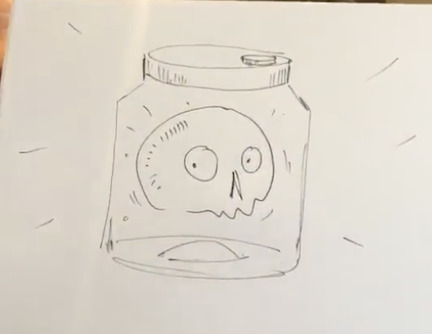
the skull originally wasn’t going to have such a key role in the series, Stroud intended for it to not appear again after the interview scene but brought it back when he realised he needed a ghostly guide/intervention
he likes to imagine the skull floats in its jar despite knowing it’s meant to be attached to the base
on how he’d draw a Scarlett and Browne logo: “I’d probably just do a skull again because everyone gets killed”
he’d never heard of Legwood before, and was intrigued and very concerned upon Raka informing him of it
he then proceeded to try and draw Legwood…
“it’s difficult to draw someone who’s meant to be good looking”
“so he just turns into a pair of legs?”
“I hope there aren’t any children watching” - Jonathan Stroud, award-winning children’s author, whilst drawing Legwood
the masterpiece itself:

he treated himself to a biscuit after experiencing the trauma of drawing Legwood
even his publicist has now been informed of Legwood:

Stroud forgot Lucy’s left handed, whoops
he agrees that diplodocuses are great (dinosaurs seemed to be a recurring theme in this stream)
though Stroud doesn’t have a sole favourite scene from L&Co, his top parts of the books are Lucy’s interview scene (it was one of the first scenes he wrote, it allowed him to see how the main trio interact with one another), the Red Room, and when Lockwood and Lucy visit the Other Side in TCS
he found it difficult to keep having to create and write unique ghosts throughout the books, but his favourite and the most fun to write was the Ealing Cannibal
all of his main characters have aspects of him in them, but the character he’s closest to is Lucy (he seems very fond of her it’s so sweet)
he added that he’d like to be like Lockwood with all the charm but it’s a shame about all the repression he’s got going on
his favourite international L&Co book covers are the Ukraine ones by Ivan Sulima
they resumed sketch requests, to which Stroud then said: “I’ve done Legwood, so what could be worse than that?”
enter “Pork Lockwood”
Stroud: “I like a challenge, I’ll try and draw it”
(god bless Raka for explaining all of these crazy fandom inside jokes to him)
Stroud: “I don’t think this Pork Lockwood is quite as thin as the original Lockwood. He’s been eating too many doughnuts … I don’t think Lucy will be too impressed by this guy, really.”
he then goes on to clarify that “it looks like he’s holding sausages but it’s meant to be iron chains”
I cannot believe this drawing is a reality
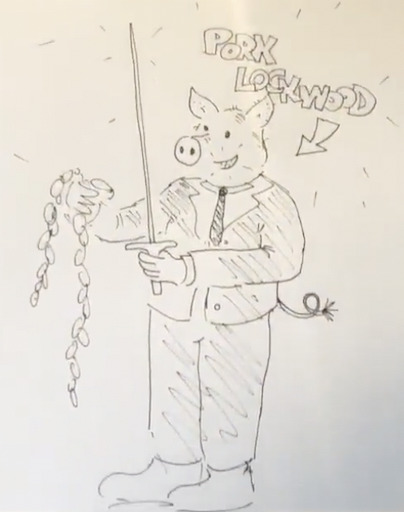
the Q&A continues, and Stroud explains that the key to having such a large cast in the L&Co series was to slowly add them throughout the books. he liked that L&Co as a company went from being small to growing into a wider family, including Holly, Flo, Kipps, Barnes, etc.
Barnes gets called the “friendly, grumpy uncle” of the family
he’s doing the same sort of thing with Scarlett and Browne, slowly introducing a wider cast of characters
Stroud gets asked if he’d ever write any more Lockwood-related things, and he says that he’d like to write more Lockwood, perhaps a series of short stories about the different ghosts from George’s casebook (but unfortunately he’s too busy drawing Pork Lockwood to get on that at the moment)
another drawing request, a Hornbeak from Scarlett and Browne
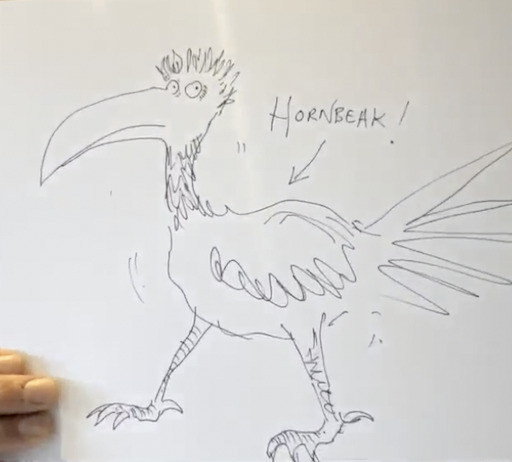
a quick reminder that if you want a chance of winning original digital art by Raka, signed copies of L&Co, or doodles by Stroud, donate to their fundraiser for Ukraine in Stroud’s Instagram bio! (link to Stroud’s IG at the top of this post)
more Q&A: would L&Co ever play Dungeons and Dragons? No—they’re too busy living that kind of scary quest narrative in their day to day life, they’d rather spend their free time eating and sleeping
at this point Raka finishes her Lucy and Lockwood piece and moves onto sketch requests, including Legwood, George doing yoga, Danny DeVito as Lockwood, Bartimaeus, Skull, and Scarlett. she’ll be posting a sketch dump at some point (along with the incredible Lockwood and Lucy piece), so I won’t post them here. (update: here’s the post!)
god bless Georgia Lawe

Stroud’s go-to biscuits are Choco Leibniz and chocolate digestives
on what Stroud likes most about writing: you sit down and you haven’t got anything in front of you. it’s an empty piece of paper, and you get to create something new that wasn’t there before—it’s thrilling to make something new and bring it to the world (he then takes a long moment to observe the creation of Raka’s Legwood)
in the L&Co Netflix show the main characters still young, but slightly older than they are in the books (he confirms that book Lucy is around 14 in TSS, while Lockwood and George are 15, and they age 2 to 3 years throughout the series).
he talks about how part of the fun of an adaptation is that it’s an interpretation; it will be slightly different but that’s the whole point, and that everyone involved in the making of the show loves the characters and their stories, and the show has been created with great love and care (he restates here that the show is likely to come out later this year)
on why Lockwood and Lucy don’t kiss in the final book: some things are so special and intimate that it’s better to have to imagine it rather than have it laid out in front of you. he wanted to keep it as something implied, to leave the readers to connect the dots and fill in the blanks rather than shove it in our faces (he admits he was also nervous about ending the series with a big kiss, and feels that it would have been a letdown)
Stroud acknowledges Ali’s lack of trousers in that BTS trio on the bed in Portland Row picture, he was very pleased to see Ali doing such a George thing
on how involved he’s been with the Netflix show: he’s been a consultant from the beginning, and though he’s not been involved on a daily basis, he’s frequently spoken with everyone, seen the scripts, and discussed problems and questions with the show-runners. he’s been close to the production, but has let them get on with it because at the end of the day, they’re the experts on all of this, not him
on how he came up with the concept for the Bartimaeus series: he wanted to turn a convention on its head; it was meant to be the opposite of Harry Potter in regards to the fact the child magician is the ‘bad guy’ and the genie was the hero. that was the starting point, and the books evolved from there
Stroud’s favourite recent reads: The Sisters Brothers - Patrick deWitt, and True Grit - Charles Portis. both are famous westerns that served as inspiration for Scarlett and Browne
Stroud’s great advice for creating stories: “add a few giant otters into it and it’ll make it more exciting”
will we ever find out what happened in Mrs Barrett’s tomb: No, unless he decides to write it into the casebook short stories that he mentioned earlier
how long did it take to write the first Lockwood book? roughly 1.5 to 2 years since he had to build the world before writing the story, and then every book after that took a year each to write
on whether the show is going to stick to the books: he can’t talk about the show in too much detail, but confirms that the guys are trying to stick close to the books and that they know them really well. he’s not against them adding extra cases and the like if they feel the need, but the show-runners are already having to strip unnecessary things from the books to make it fit into a tv show format, so he doesn’t know if they will ever choose to do that
he says it would be interesting to see what would happen if Scarlett met Lockwood and Lucy… perhaps he’ll have to have weird fusion of them one day
he says Raka’s artwork inspires him 🥺
the stream then came to a close, but both Stroud and Raka would like to do it again some time! fingers crossed they do :)
#lockwood & co#the outlaws scarlett and browne#bartimaeus#jonathan stroud#doodlingraka#lockwood and co#tosab
125 notes
·
View notes